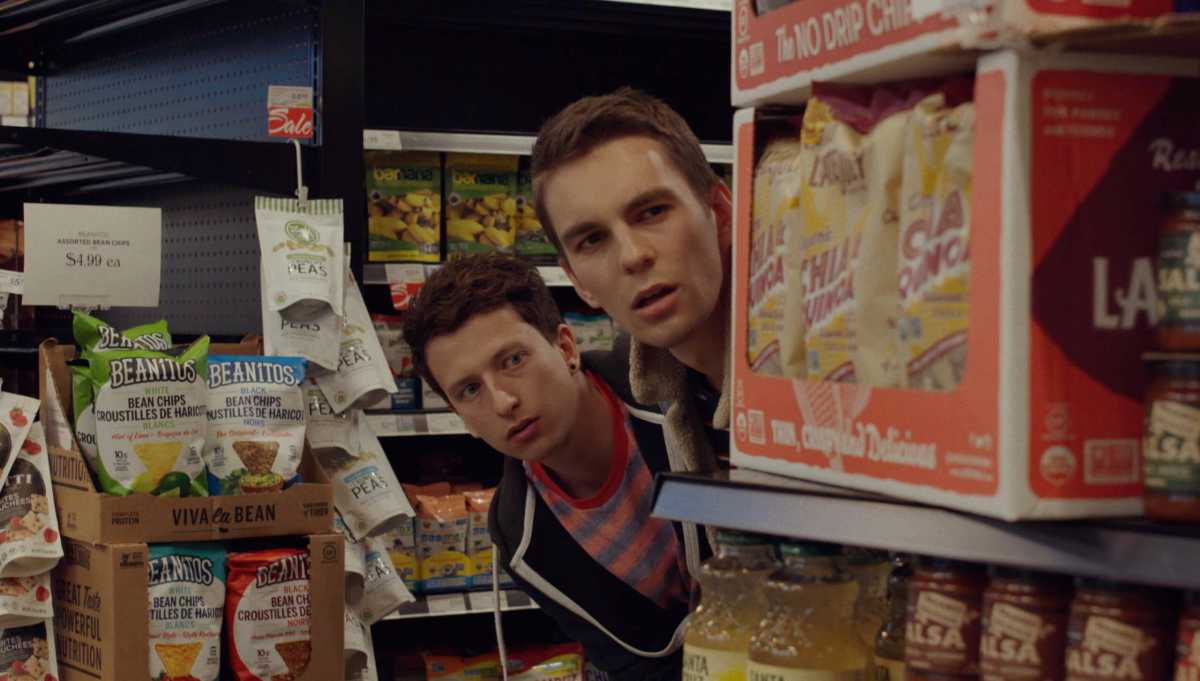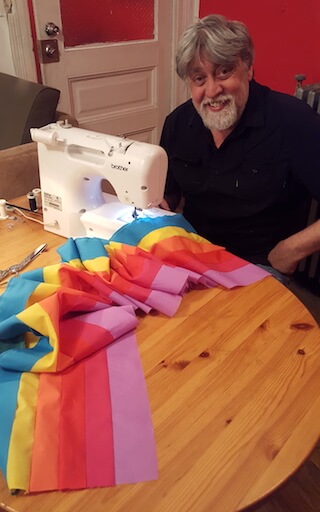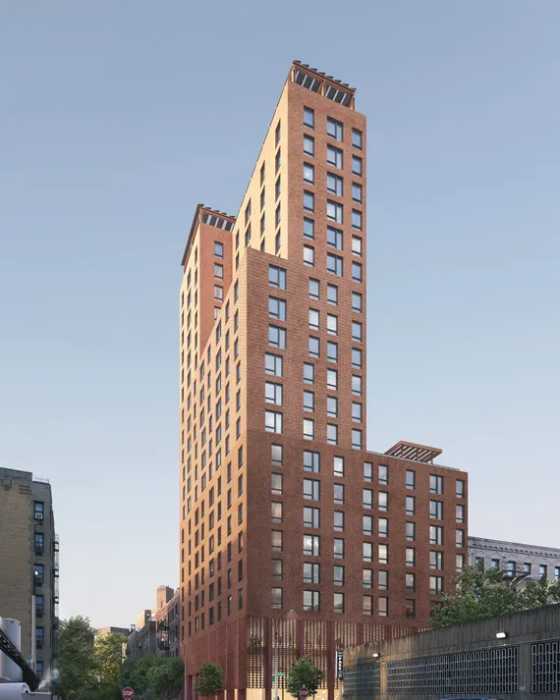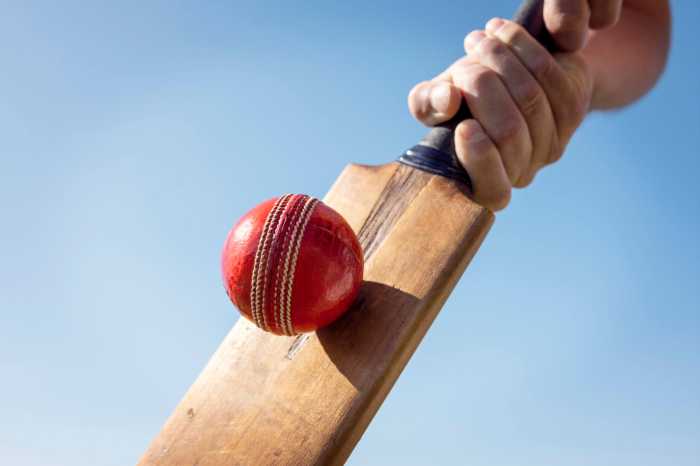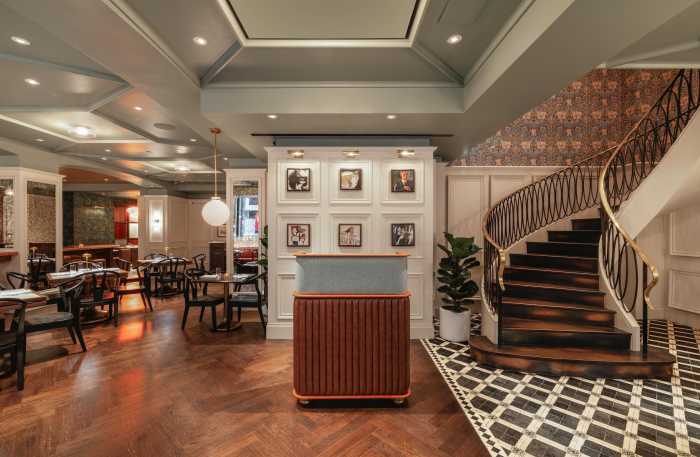Out gay actor and writer Chris Ball is ingratiating as Bray, a recent college graduate in the sweet coming-of-age road trip comedy-drama “Summerland.” The film has Bray heading to the titular music festival with his best friend Oliver (Rory J. Saper) and Oliver’s girlfriend, Stacey (Maddie Phillips). Bray’s purpose for the trip is to meet Shawn (Dylan Playfair), a guy he met online. However, Bray has been misleading Shawn; in their texts he is pretending to be “Victoria” and using Stacey’s image as a come-on.
As the trio drive from Spokane to California, they come upon a variety of people and experience a series of reality checks that help them better realize who they are and what they want in life. The film also includes moments of poignancy even as its characters are enjoying sex-and-drug-fueled adventures.
Chris Ball plays a gay guy in trio of friends who find themselves while driving
Ball spoke with Gay City News via Zoom about writing and starring in “Summerland.”
GARY M. KRAMER: You’ve worked in the props and set department on several features, acted in and produced a few films, but “Summerland” is the first feature you’ve co-written. Can you talk about your career in cinema and how you have developed to this point?
CHRIS BALL: After I didn’t graduate high school, I got my first job on a film set. I knew I wanted to be in film and I wanted to act, but I also wanted to tell my own stories. But where do you start? Become an actor and audition? I saw props, and that was my in; it was my way of networking on set. I did props for a number of years. It was like my film school. I got in with a really good group. Kurt Harder, one of the Lankyboys [Noah Kentis is the other, and the two are the directing duo], wrote this script for fun, and when I read it, it was like, “This is my life. I have to do it.” We wanted to wait for the right time and have the connections and the relationships in the industry to be able pull it off.
KRAMER: What can you say about making a road trip movie and visiting San Francisco’s Castro district?
BALL: It came from growing up watching road trip movies — all the sites, drugs, good times, and meeting all of these interesting characters along the way. Six of us were actually on the road for six weeks in the RV doing a road trip making the movie. So, we got the authentic experience of a having a road trip movie while on a road trip making a road trip movie. Visiting the Castro was important to me given my love for gay history. Cleve Jones [who is thanked in the credits] is a good friend of mine. I worked with him on “When We Rise.” He changed my life and brought me closer to the gay community and my love for gay culture.
KRAMER: Let’s talk about Bray’s friendship with Oliver. What observations do you have about their relationship?
BALL: Oliver is, obviously, kind of a shithead in the movie. Oliver is trying to have fun and live the party life. He’s the bad influence who makes us truer to ourselves, pushing us past legal boundaries and by doing that pushing us past our personal boundaries. They are best friends because they live together, but they become closer and realize something after what they go through in the film.
KRAMER: I like that Bray’s sexuality is not an issue for anyone. Can you talk about that decision?
BALL: One thing that was important to me was that Bray’s sexuality doesn’t define him. When I grew up, the only gay characters I saw in movies were comedic relief or tropes, or if they were the lead it was about their struggle of coming out or bullying — and those are important stories to tell—but it’s important to normalize it. No homophobia is going to exist in “Summerland.” His friends are okay with it. Khephra [Khephra Lord] is a hookup stereotype [Bray meets at a Grindr party. But] Bray is not on Grindr. Khephra represents a seductive force that is often present in the gay community and Bray is tempted by him. Khephra and Bray are opposites, but there is a dichotomy there.
KRAMER: Yes, Khephra and Bray discuss connection versus experience. Bray is not ashamed to admit he is a bottom, and he wants to have a meaningful relationship. It should certainly speak to gay youth.
BALL: I hope it does speak to gay youth and especially millennials because the hookup culture is more prevalent now. Gays have this image, and I wanted to show the other side. You don’t have to do Grindr or live the hookup culture. And it’s okay to hold out for something real. We are meeting and connecting online first. How many of us can relate to that? I came out to friends online before I came out to my parents. It was important for me to represent those people like me as well as the insecure bottoms out there. I also had the inclination to be in good shape to film and my boyfriend at the time said, “Why? Not every gay twink is totally ripped. You’re breaking the usual stereotypes. Break one more!”
KRAMER: Several characters in the film lie or conceal the truth to avoid hurting others. Of course, the message in “Summerland” is “Be yourself.” Can you talk about honesty, and why you think people are afraid to reveal who they are?
BALL: A lot of it does have to do with the media and how gays are portrayed. I’d like to see more gay characters like the ones we have in the movie. There’s toxic masculinity, but there’s toxic homosexuality as well. There are a lot of gay tropes and gay stereotypes that we are faced with in the media every day and the more we can normalize gay characters, the better. Where characters are in movies and they are gay just ‘cause. Being gay doesn’t define them.
SUMMERLAND | Directed by Lankyboy | Superchill/ First Look Films | Available VOD and on digital platforms Sep. 14
To sign up for the Gay City News email newsletter, visit gaycitynews.com/newsletter.

